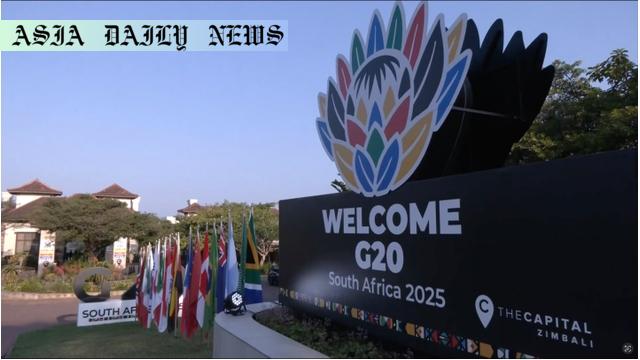G20 Summit – Finance ministers and central bank governors from the Group of 20 economies are meeting in South Africa amid economic uncertainties to discuss global risks and crucial strategies.

Introduction to the G20 Finance Chiefs’ Meeting
The Group of 20 (G20), a coalition of the world’s leading and emerging economies, has convened its finance ministers and central bank governors in a crucial two-day gathering in South Africa. This summit is poised to address several urgent and multifaceted issues confronting the global economy at a time of considerable turbulence. Conversations will revolve around the imminent U.S tariffs proposed by President Donald Trump, the financial strain of developing nations, geopolitical crises, and the potential for global taxation reforms on enterprises. This gathering will test the G20’s ability to showcase unity in stabilizing worldwide economic dynamics.
The Potential Impacts of Trump’s Trade Tariffs
As President Trump prepares to impose new tariffs on August 1, the global economy braces for widespread ramifications across trade, production, and supply chains. These tariffs, aimed at U.S. trade partners, signal a seismic shift in trade policies, with far-reaching consequences for the interconnected global economy. Many nations express concerns over how such unilateral actions could undermine long-standing economic cooperation and further strain diplomatic ties. The G20 platform will serve as a stage to mediate varying perspectives, especially those representing key stakeholders like China, Japan, and European nations.
Addressing Geopolitical and Economic Challenges
The world economy is currently at a crossroads, influenced by mounting geopolitical tensions in regions like the Middle East and Ukraine. Countries worldwide share mutual apprehensions about these destabilizing factors. Complementing these challenges is the burden of rising debt among developing nations. Discussions will likely navigate the creation of sustainable frameworks that allow fiscally strained countries to manage debts without stifling their economic growth prospects.
Taxation Rules and the Road Ahead
In an era defined by transnational corporations and digital transformation, the absence of comprehensive tax regulations has been a persistent problem. As global enterprises evade taxation, often by basing operations in lenient jurisdictions, the call for a unified framework grows louder. Policymakers at the summit will deliberate on strategies to address this lacuna and implement rules that ensure fair contributions by multinational businesses, fostering equitable economic systems globally.
The Call for Unity Amid Economic Uncertainties
With nations frequently finding themselves at odds over trade policies, geopolitical approaches, and fiscal strategies, the G20 meeting represents an opportunity to rebuild bridges and establish cooperative mechanisms. The precarious state of the global economy necessitates vision and leadership—qualities the G20 nations must collectively exhibit to guide the world toward stability and inclusive prosperity. This summit underscores the importance of dialogue and diplomacy for crafting resilient solutions to pressing global concerns.
Commentary
The Critical Importance of the G20 Summit
As the world grapples with increasingly complex economic and geopolitical challenges, the importance of the G20 summit cannot be overstated. Bringing together representatives from both advanced and emerging economies, this gathering serves as a vital platform to address some of the most pressing issues of our time. From the impending U.S. tariffs to discussions on global taxation laws, there is no shortage of critical topics requiring urgent attention.
The Ripple Effects of Trade Tariffs
President Trump’s proposed trade tariffs could signal a dramatic shift in the global economic landscape, with potential consequences spanning every sector and region. These policies may disrupt supply chains, spark retaliatory measures, and exacerbate tensions among trade partners. Through collaborative discussion, the G20 must explore innovative ways to mitigate the fallout while maintaining healthy trade partnerships that are critical to global prosperity.
Uniting Amid Diversity
One of the hallmark challenges of the G20 is its diversity in perspectives, priorities, and economic conditions. While these differences can complicate decision-making, they also represent a unique strength when harnessed effectively. By adopting a cooperative mindset, G20 nations have the opportunity to cultivate policies that are not only effective but also equitable and inclusive. This summit, therefore, is not just a test of dialogue but a practical exhibition of diplomacy.
Hope for Positive Outcomes
At a time when the world faces mounting uncertainties, the ability of G20 nations to find common ground offers a beacon of hope. Whether on tariffs, taxation, or global debt, each deliberation carries the potential to shape our shared future. For observers worldwide, the outcomes of this summit will serve as an indicator of the international community’s commitment to unity and collective progress.


